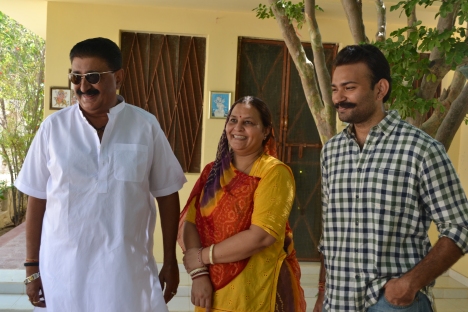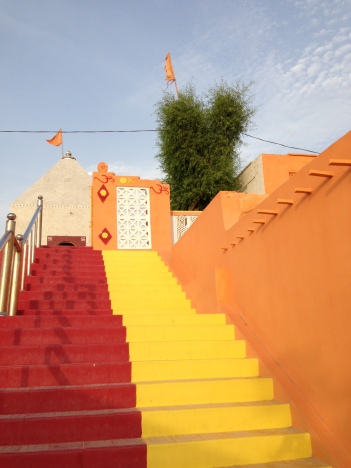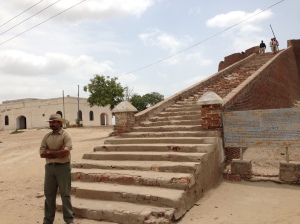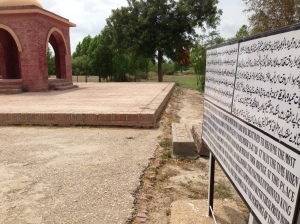
Rana Hameer Singh, Rani Nalini and son Karni Sodha at home in Amarkot. Photo: Maha Sarwar Shahid
Something I wrote for Aman ki Asha after a magical trip to Tharparkar last weekend…
The Rana and Rani of Amarkot (Umerkot) urge a liberal visa regime between India and Pakistan
By Beena Sarwar
“The people-to-people contacts idea or vision initially came from the Indian side, when we were stuck, unable to move forward. My country had taken the position that Kashmir has to come first, that no dialogue was possible until that issue was resolved,” says Rana Hamir Singh, head of the Hindu Sodha Thakur Rajput clan in Pakistan, in Umerkot, former capital of Sindh.Umerkot is famous as the birthplace of the Mughal Emperor Akbar, after Sher Shah Suri ousted Humayun. Had it not been for the succour that Rana Prasad, the Hindu Sodha Rajput ruler of Amarkot provided, there would have been no Mughal empire, no Taj Mahal or Agra Fort for the world to wonder at, point out the Sodha Rajputs of Pakistan. Amarkot was later re-named after Umer, king of the Soomro dynasty (Umer-Marvi folktale fame).
Rana Hamir Singh’s father, Rana Chander Singh who passed away in 2009, was one of the early members of the Pakistan People’s Party and several times an elected member of the National Assembly. However, the Ranas see themselves as representatives “not just of the upper caste Hindu Rajputs, but of all the people in Thar, whatever their religion, caste or creed,” says Rana Hamir Singh.
He is proud of his ancient lineage, Sindhi roots, language (Dhatki or Thari), and Sufi heritage linked to the dargah at Ajmer Sharif. It is this heritage that the Ranas traditionally identify with more than their Hindu beliefs.
They have proved their loyalty to these ideals multiple times, not least with the sacrifice of their ancestor Rana Rattan Singh who fought to keep Sindh free from British colonialism. The British captured and executed him in his own fort at Amarkot (circa 1853), on top of a high platform constructed especially to make the hanging visible for miles around and serve as an example.
Legend has it that at the gallows, his last wish was to give a twist to his magnificent moustache in a final gesture of defiance. The Sindhi folk song ‘Mor tor tillay Rana‘ is based on his heroism.
After the British victory, the Sodhas moved to Rana Jagir, 12 km from Umerkot to the sprawling, single-storey rawla the family built where their descendants still live. The fort has since then been government property and is in ruins, with only one of the outer walls partially restored. Close to the site where Rana Rattan Singh was martyred is a modest museum containing various artifacts and books – including a Persian translation of the Mahabharat.
Rana Hamir Singh’s grandfather Arjun Singh contested the decisive 1946 elections on an All India Muslim League ticket, resisting all pressures by the Congress to join it on the basis of being Hindu.
Nehru came especially to Amarkot where he held his first public meeting, but this attempt to rally support for the Congress along religious lines, appealing to the area’s Hindu population, was futile against the Rana’s influence. (Thar – later divided into four districts, Tharparkar, Umerkot, Mirpurkhas and Nagarparkar – still has a Hindu population of some 40%, despite current pressures and migration patterns).
 The syncretic culture of Thar is evident in the respect for each other’s religions exhibited traditionally by Muslims and Hindus. When the Rana is served food and drink while paying a condolence call to a bereaved Muslim neighbour in Ramzan, he won’t take it. Muslims refrain from slaughtering cows and Hindus will not cook wild boar in their kitchens “because then their Muslim friends will not feel comfortable eating there,” explains young Karni Singh, Rana Hamir Singh’s son, a law student.
The syncretic culture of Thar is evident in the respect for each other’s religions exhibited traditionally by Muslims and Hindus. When the Rana is served food and drink while paying a condolence call to a bereaved Muslim neighbour in Ramzan, he won’t take it. Muslims refrain from slaughtering cows and Hindus will not cook wild boar in their kitchens “because then their Muslim friends will not feel comfortable eating there,” explains young Karni Singh, Rana Hamir Singh’s son, a law student.

Temple in the desert. Photo: Beena Sarwar
It was the late Rana Chander Singh who brokered the former Indian Prime Minister A. B. Vajpayee’s historic trip to Lahore to meet Nawaz Sharif. Then a Member of the National Assembly as well as a SAARC Committee member, Rana Chander Singh used his family ties with Jaswant Singh, to get him to convey the message to Vajpayee and convince him to make the trip.
Earlier it was the Congress, “led by Rajiv Gandhi, who said let’s have people-to-people contact, trade, and other confidence building measures. It is through confidence building that other disputes will be solved,” points out Rana Hamir Singh.
“My country is now very liberal with its visa policy. We don’t require any NOC (no objection certificate) or official guarantees to grant a visa to Indian visitors. We are not even strict about the city visa policy – if Indian visitors move outside the approved city, and visit a place for which they don’t have a visa, the Pakistan authorities don’t arrest them and throw them in jail,” he says.
“On the other hand, India has all these restrictions for Pakistani visitors. How can an ordinary Pakistani obtain the guarantee of a Grade 17 or above Indian officer? I ask the Indian government again, ease these restrictions. Open our embassy in Bombay, open your embassy in Karachi. I ask again, as neighbours, let’s move ahead on the vision outlined by you, move forward practically.”
His wife, Rani Nalini is from the Rathore family of Jodhpur, in India. She studied in Ajmer, and came to Pakistan after getting married in 1987. She observes strict purdah and never makes any public appearances or statements. However, the issue of peace and goodwill between her country of birth, India and adopted country Pakistan is too close to her heart to remain silent on.
“As far as the people are concerned, relations between India and Pakistan are okay,” she says in her simple, direct way. “Anyone who goes there, and anyone who comes here, they don’t feel any differences. They feel happy to meet each other. They like the same TV serials, the same music, and feel at home in the other country.”
The problem arises because of the restrictive visa regime, which particularly affects the Rajputs of Pakistan, as they are forbidden to marry within their own family and have to forge marital alliances with Rajput families in India. Daughters who are married across the border always face a problem in visiting their country of birth.
“Sometimes there’s an emergency. Where are we in Pakistan going to find a Grade 17 officer to approve our applications? By the time you collect the document and get everything together, the emergency is over. Even for weddings, it takes time. One family waited three years for a wedding, fulfilling all the formalities,” says Rani Nalini.
“It can take 45 days to three months for visas for most people. We (the Rana family) get it quickly, but it’s very hard for others. It is the Hindus of Pakistan who particularly suffer because of these policies. I can’t stress enough the urgency of resolving this issue.”
Filed under: Pakistan-India | Tagged: Amarkot, Hindus in Pakistan, Rajput, Rana Jagir, Rana Sodha, Sindh folk tale, Sufi, Umer Marvi, Umerkot |





[…] This young man, a lawyer by training, is the son of Rani Nalini Prabha and Rana Hamir Singh of Amarkot. We had stayed them last year, driving across the Sindh desert into Tharparkar, with a doctor friend has family connections with them going back generations. I wrote about that trip here: […]
LikeLike
[…] Karni Sodha, a lawyer by training, is the son of Rani Nalini Prabha and Rana Hamir Singh of Amarkot. We had stayed them last year, driving across the Sindh desert into Tharparkar, with a doctor friend has family connections with them going back generations. I wrote about that trip here: […]
LikeLike
[…] is traditionally respect for each other’s religions among Muslims and Hindus. When a Hindu pays a condolence call to a bereaved Muslim neighbour, he is […]
LikeLike
We are proud of such a great royal Hindu family who has maintained its status so high in Pakisthan
LikeLike